- Home
- Aaron Allston
Terminator 3--Terminator Dreams Page 5
Terminator 3--Terminator Dreams Read online
Page 5
“I don’t believe in ESP,” said Colonel Sid Walker. An African-American man of about forty-five, short, bald, and hard-muscled, he was overall commander of the Resistance 1st Security Regiment.
Lake shot him a dismissive glance. “I don’t believe in any buzzword. Such as military intelligence, for instance. Don’t define the event by the buzzword. Define the event by its characteristics. What just happened here? Some sort of extraordinary level of mind-to-mind contact. If you want to, come up with a new term for it, something not tainted by wishful thinking and generations of fuzzy minds. ‘Sleep-state biological telephony.’”
Walker glowered at her. Lake was outside his direct control, and he, like everyone else in the command structure, had too often been the target of her verbal scorn.
“Who’s not here?” asked Mike, her words quiet, a seeming non sequitur. She was staring at the center of the table, not meeting anyone’s eye.
Lake gave her an admonishing look. “Most of humanity, Mike.”
Mike glanced at her, unimpressed by her acidity. “Look around and use your alleged scientific observational skills. Everyone who was sleeping within about a thirty-foot radius ten minutes ago is now up and here with a Terminator chicken-wing dream fresh in his head. Except for whom?”
Lake looked around. “Earl—”
“He was awake, on guard,” Mike said.
“Ten—no, wait, he’s on painkillers I gave him for his ribs. Probably can’t dream, or is incapable of waking up right now. And, uh, Daniel.”
Mike nodded. “Daniel.”
John shrugged. “So?”
“So you know the only one of us who was ever in a position to see a Terminator malfunction like that in real life, the only one of us who actually worked on the CRS project at Edwards, was Daniel. Earl was at Edwards, but not on the CRS team.”
Kate smiled. “Mike, that’s reading a lot into things. Daniel doesn’t remember any of that. He lost his memory around Judgment Day. He spent years wandering around in the wilderness like some mad prophet until John and I found him. If it weren’t for the ID he carried, he wouldn’t know his own name, and we wouldn’t have been able to confirm that he worked at Edwards at that time.”
Mike nodded, her expression glum. “The other day, when you got back from the Eosphor Tech mission, he told me he’d seen a cloud shaped like a skull, and that he was sure, absolute-to-the-bone sure, that he’d had a dream about that a long time ago. Before Judgment Day. It’s the only time I’ve ever heard him claim to remember something from before J-Day.”
“The only connection I see is dreams,” Lake said.
“Dreams and Daniel.” Mike stood up. “Let’s go experiment.”
John followed suit. “On what?”
“On Daniel Ávila.”
Lake rubbed her hands together. “Oh, goody.”
* * *
Daniel lay on his back, a blanket half-draped over him, his eyes closed. The cots around him were empty, their former occupants clustered behind John, Kate, and Mike as they stared down at him. The light cast by the half-shrouded lantern Kate carried was dim, but sufficient to see that Daniel was sweating out of proportion to the heat in this corridor, even given his extra weight.
Daniel mumbled words that sounded something like “To hell with the general.”
Mike leaned closer. “Daniel, where are you?” Her voice was low, intense.
Daniel turned his head as if listening. “Hammock.”
“Hammock where?”
“Home. Bakersfield.”
“What’s going on?”
“He made fun of me. He didn’t say thank-you.”
“Who didn’t?”
“For fixing the arm.”
“Who didn’t?”
“General Brewster.”
John felt Kate sag against him. Lieutenant General Robert Brewster, commander of the CRS project at Edwards AFB, dead since Judgment Day, had been her father. Kate’s expression had blanked from faintly curious to shocked in an instant. John put an arm around her, to steady her, to reassure her.
Mike continued, “Tell me about your dreams, Daniel.”
“The new ones?”
“Sure, the new ones.”
“They’re loose, all the T’s. Old ones, new ones. Kill everybody. We live in caves. All my work, it’s just going to kill us. Linda.”
John frowned. “Who’s Linda?”
Daniel didn’t answer. John gestured to Mike, and after a moment’s delay she repeated the question: “Who’s Linda?”
“Alex’s wife. Hot, hot, hot. She’s here.” Daniel opened his eyes and jerked as he realized that he was surrounded. His voice changed, became deeper, more resonant. “What the hell?”
“Sorry to wake you,” John said. “We’ll leave. You can go back to sleep.”
Daniel laughed. “Yeah, right. I wake up with a lynch mob around me and the adrenaline shot to go with it, and you expect me to doze off again? Besides, it’s four-thirty, isn’t it?”
Walker checked his timepiece, a pocket watch that had to be a century old; its elegantly engraved case had been smoothed and blurred with wear over the years. “You’re about ten minutes off.” He snapped the case shut.
“Well, I’d be awake in an hour anyway, might as well get up now.” Daniel stretched, his motion threatening to topple him off the side of the cot.
Lake turned away. Over her shoulder, she told Mike, “This doesn’t prove anything. He was talking about our current situation.”
“I don’t think so.” Mike turned back to Daniel. “Do you remember what you were dreaming just now?”
He shook his head and heaved himself upright. “I wasn’t dreaming.”
“A hammock? A girl named Linda?”
“Nope.” He stood, not in the least sleep-awkward. He was still in his camo dress, which was rumpled from his sleep.
“Do you know a girl named Linda?” she persisted.
“Nope. No, wait. Isn’t there a Linda at the compound near the Presidio? Linda Cho? About thirty, cute, makes paper?”
Mike didn’t answer. She just turned to look back at Lake.
* * *
John and most of his command staff sat at a table across the mess hall from Daniel. The big man sat alone, enjoying his early breakfast, chatting with the Vega Compound cook who brought first one plate then another to him. He hadn’t taken it personally when John had excluded him from the advisers’ table. Everyone on John’s staff knew his policy: Information that kept people alive was to be spread as far and as fast as possible, while information that, if spread, would tend to get people killed, stayed compartmentalized. Information whose potential danger was unknown fell into the second category. Every one of John’s advisers had been cut out of operational discussions at one time or another.
“Remember, I’m the one who found most of the information we ever got on Daniel Ávila,” Mike said. She kept her voice down so that her words would not carry to the man they were talking about. “We know that he and his family lived near Bakersfield. We know from his programming skills that he was a very proficient programmer before Judgment Day. He had ID cards both for Edwards AFB and for the CRS project, where the Terminators and Skynet were designed. In the years since we’ve had him, he taught us how to reprogram the few Terminators we captured more or less intact, he’s demonstrated he can often anticipate how Skynet ‘thinks,’ and so on, all without remembering a single thing that happened before the bombs dropped.”
“Until now,” Kate said.
“Even now. While he was talking in his sleep, he remembered things from before. But the instant he woke up, he couldn’t. He couldn’t even remember the dream he’d just woken up out of. How likely is that?”
“Not very, I guess.” John rubbed the stubble on his chin. “What are you maneuvering toward, Mike?”
“I don’t think he’s dreaming. I think there’s some sort of weird connection between the Daniel of today and the Daniel of just before Judgment Day, and thing
s he sees in one time are bleeding across to the other time. In either direction.”
“O-kay,” Lake said. She put on an artificially bright smile and turned toward their leader. “So, John, are we heading on today, or tomorrow?”
“Tomorrow,” John said. “After the rest of the Hell-Hounds and the workers they’re shepherding get back. Mike, that’s a fairly lunatic suggestion.”
“Sure it is.” Mike’s tone was agreeable. “Now, factor this in. In the ruins of CRS at Edwards, I found documents indicating that just before J-Day, Air Force security teams were looking for Daniel. He’d run off. He was under the delusion that the Terminators were going to rise up and band together to destroy human civilization. Of course, he was right, which kind of blunts the notion that he was crazy. But where’d he get the idea? I think he got it from his modern mind, from a connection to the knowledge he possesses now.”
Lake sighed. “You remember toilet paper, Mike? You remember how thin it was, how you could see right through it, how it tore under the slightest pressure? Well—”
“Shut up, Tamara,” Mike said.
The other woman didn’t look put out. She often argued in such a fashion that she was told to shut up. “I don’t think I will. Why is Daniel the only person who can do this? And if not, why haven’t we heard of others?”
“We have.” Mike pointed at John.
John shook his head. “I don’t get you.”
“When you were a teenager, after the T-800 came back to rescue you, you had dreams about Terminators overrunning the world.”
Lake made a scornful noise. “Based on what he’d been told. By that Terminator, by his mother.”
“Aha.” Mike’s tone was triumphant. “John, didn’t you tell me once that you knew from a dream that the HKs were called Hunter-Killers?”
They all looked at him. John nodded slowly. “Yeah. I did.”
“What was that, Tamara? A lucky guess?”
Lake still looked unconvinced. “No, the T-800 told him. He just doesn’t remember.”
Mike nodded. “That’s possible. It’s also possible that the extremely stressed-out John Connor of the 1990s and the extremely stressed-out John Connor of the 2020s reached out to one another, the younger one to validate his very existence, the older one to reassure his younger self, the same way I think the young Daniel and today’s Daniel are doing.”
Lake’s expression offered no indication that she was yielding. “The tabloids went out of business the same day as the rest of the world, Mike. You’ve got no one to sell this story to.”
Mike turned back to John. “Listen, I know that what I’m suggesting sounds impossible. But what I’m proposing won’t cost us much in the way of resources. I propose a proof of concept.” At John’s gesture, she continued. “The next time we find Daniel in one of these weird states, we talk to him. We ask the younger him to bury a time capsule.”
John shrugged. “Where? And with what in it?”
“Somewhere on his family property, I think. He, the younger him, knows it like the back of his hand, and we know from his driver’s license, from the CRS records, where it is. As for what goes in the capsule…” Mike snickered, a noise she seldom made. “Is there anything we need? Canned ham? World atlas on CD-ROM?”
“I could use a viral reactor,” Lake said. Her voice was, for once, untouched by scorn. “Though it might be hard for a guy being monitored by security forces in those days to get something like that without being noticed.”
“Special forces field manuals,” Walker said. “Books on manufacturing high-tech fabrications materials—composite armors, polymers, that sort of thing.”
“Copies of the various iterations of the Terminator and Skynet operating systems,” Kate said. “But should they be printed on durable paper or on electronic media?”
“Geological and geographical data,” John said. “To give us a greater depth of knowledge about cavern systems we can use. Information on mining operations in the U.S. and around the world, for the same reason.”
“Wait, wait,” Walker said. “If what Mike suggests is real—and I’ll leave the theories to the theoreticians—we don’t have to wait for Daniel’s next fugue state. If we do this, we’ve already done it. All that stuff is already waiting in a hole in the ground on the Ávila property. We could send someone out tomorrow to get to it as soon as possible.”
“Call me a coward,” Mike said, “but I still believe in cause and effect, even when time travel is involved. Also, until we talk to the young Daniel, we won’t know exactly where on the property he’s going to plant the stuff. So we should wait.”
“We’ll wait,” John said. “But you’re right, Mike. This costs us exactly one special op to get a crew and a handful of shovels out to Bakersfield. Against the possible gains it has to offer us, it’s worth the effort.”
He looked over at Daniel, as did the others. Suddenly aware that he was under scrutiny, Daniel flashed them a theatrical smile. He stuck his knife into a piece of potato, raised it so that the potato was on top, and marched it across his table like an edible puppet.
Lake cleared her throat. “Are you sure we can’t do this with someone less strange?”
August 2029
On the Road to Hornet Compound
The convoy carrying John Connor’s command staff, his mission personnel, and about half of the machinery scavenged from Eosphor Technologies was stretched across some twenty miles of California back roads.
Far ahead were the fast, heavily armed vehicles carrying units of the 1st Resistance Rangers and the Hell-Hounds, who were acting as point guard. A few miles behind them was John’s Humvee; Kate, a driver, and a communications specialist were with him. Here in the center were the very vulnerable black minibus carrying members of John’s command staff and two trucks full of machinery. Miles behind was an SUV with more rangers and, on two aged motorcycles that leaked oil, Peter “Crazy Pete” King and Pamela “Warthog” Berry, members of the Scalpers, another unit of the Resistance First Security Regiment. The Scalpers and Hell-Hounds were charged with detecting and confronting any Terminator or Hunter-Killer units that might discover the convoy as it ran slowly, without lights, toward the compound destined to receive the fabrication equipment.
John Connor’s permanent base of operations was Home Plate compound, an extensive network of storm drains, basements, and post–Judgment Day underground construction beneath the charred and flattened ruins of Beverly Hills. It was far enough from the radioactive portions of Los Angeles to be comparatively safe, yet close enough for the residents of Home Plate to use L.A.’s storm drains and subway tunnels as ready underground transportation. It was ideally situated to serve as the nerve center of the Human Resistance—but, ultimately, it could be no more than the nerve center. People could not accumulate there by the hundreds or thousands; the increased activity would inevitably alert Skynet to its exact location, and bunker-buster bombs would drop or robot assault forces would swarm in.
No, when it came to human survival, decentralization was the name of the game. What was left of the American population was spread widely and thinly across the map. If any places could be considered populous, they were the mountain regions, especially those portions where caves were numerous. Humans built their communities in caves and caverns, within mountain tunnels, in sewer, subway, and storm drain systems, in mines, in deep basements, in hidden bunkers, in bank vaults—anywhere the walls were thick enough or deep enough to prevent Skynet’s aerial or satellite cameras from picking up heat signatures that said “humans live here.”
In addition, Connor insisted that each compound’s name have nothing to do with its geographical location. A compound in San Francisco would never be named Bay Compound or Golden Gate Compound. An infiltrated Terminator or Skynet listening device overhearing just a snatch of conversation mentioning such a place would doom a compound if Skynet could associate its name with its location.
At Vega Compound, the fabrication machinery they’d retrie
ved from Eosphor Technologies had been divided into two roughly equivalent sets of units. As part of Vega Compound’s reward for acting as a staging area for the Eosphor mission, Connor had decided to leave them one set. The other was being transported to Hornet Compound.
Before Judgment Day, Hornet had been a gold mine in the Sierra Nevada mountains, originally dug and abandoned in the nineteenth century, then reopened and worked successfully for several years in the 1960s and 1970s as Reid Precious Metals Mine #3. Remote and deep, it became a Resistance hideaway about ten years after Judgment Day and its population had grown ever since. Connor believed in spreading the wealth around—the wealth of knowledge, the wealth of medicine, the wealth of manufacturing ability. Even the wealth of genes; he regularly mandated transfers of personnel from compound to compound, not just to improve the state of knowledge in this new society but to reduce the likelihood of inbreeding.
Thirty hours after the caravan departed Sacramento, Daniel Ávila, lying across one full seat of what had once been a miniature school bus, began to snore, and then said, “Shut that head up.”
From their respective seats, illuminated only by moonlight, Mike and Lake exchanged glances. This was not the best of times to begin their experiment.
Daniel continued, “Keep stealing my code. Keep messing it up.”
As he spoke, Sid Walker came awake and sat upright. It took him less than a second to realize what was happening. He caught Mike’s eye and nodded. “I say, go for it.”
“Yeah.” Mike’s tone was grudging. She slid back to the seat just in front of Daniel’s. Walker and Lake moved forward to take the seat behind his. “Daniel,” Mike said, “where are you?”
“In bed.”
“At home?”
“At home.”
“Are you alone?”
Daniel sighed. It was a noise of frustration. Both Mike and Lake grinned.
“Danny, do you keep a pen and paper in your room?”
“Uh-huh.”
“I want you to get them. But don’t wake up. Open your eyes but stay calm and quiet and I’ll keep talking to you.”
“Uh-huh.”
“Are you getting the paper?”

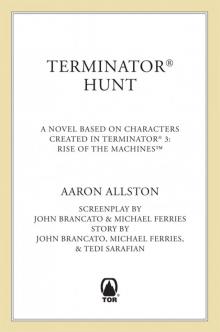 Terminator 3--Terminator Hunt
Terminator 3--Terminator Hunt Mercy Kil
Mercy Kil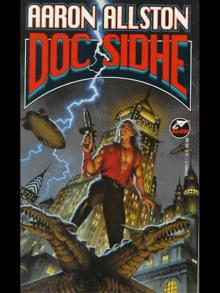 Doc Sidhe
Doc Sidhe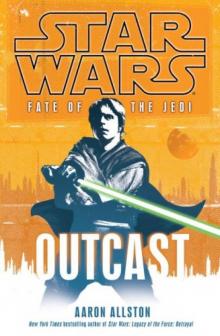 Star Wars: Fate of the Jedi: Outcast
Star Wars: Fate of the Jedi: Outcast Fate of the Jedi: Backlash
Fate of the Jedi: Backlash Mercy Kill
Mercy Kill Rebel Stand
Rebel Stand Wraith Squadron
Wraith Squadron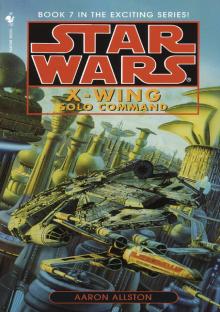 Star Wars: X-Wing VII: Solo Command
Star Wars: X-Wing VII: Solo Command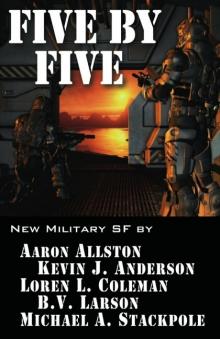 Five by Five
Five by Five Solo Command
Solo Command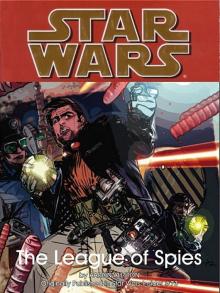 Star Wars: The Clone Wars Short Stories: The League of Spies
Star Wars: The Clone Wars Short Stories: The League of Spies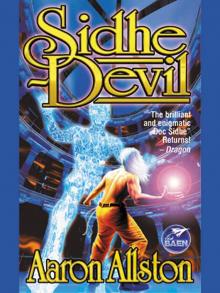 Sidhe-Devil
Sidhe-Devil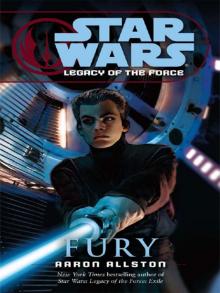 Star Wars: Legacy of the Force: Fury
Star Wars: Legacy of the Force: Fury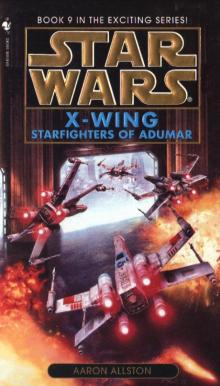 Starfighters of Adumar
Starfighters of Adumar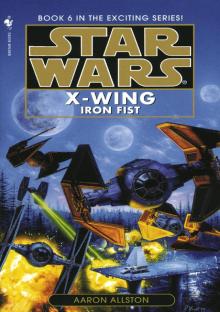 Star Wars: X-Wing VI: Iron Fist
Star Wars: X-Wing VI: Iron Fist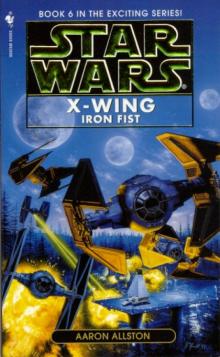 Star Wars - X-Wing - Iron Fist
Star Wars - X-Wing - Iron Fist Exile
Exile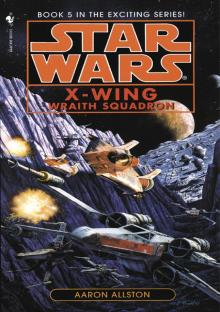 Star Wars: X-Wing V: Wraith Squadron
Star Wars: X-Wing V: Wraith Squadron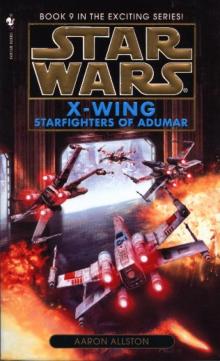 Star Wars - X-Wing - Starfighters of Adumar
Star Wars - X-Wing - Starfighters of Adumar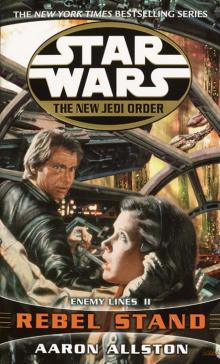 Rebel Stand: Enemy Lines II
Rebel Stand: Enemy Lines II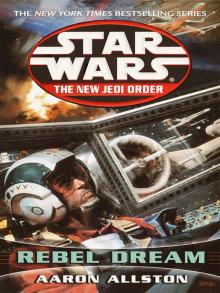 Rebel Dream: Enemy Lines I
Rebel Dream: Enemy Lines I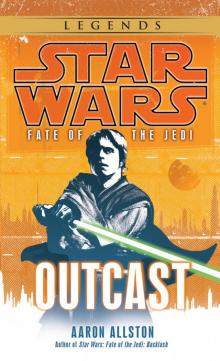 Outcast
Outcast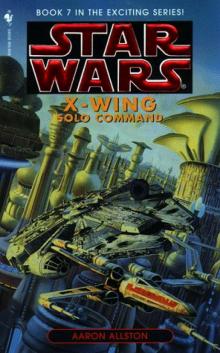 Star Wars - X-Wing 07 - Solo Command
Star Wars - X-Wing 07 - Solo Command